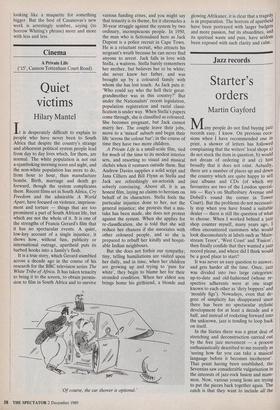Cinema
A Private Life (`15', Cannon Tottenham Court Road)
Quiet victims
Hilary Mantel It is desperately difficult to explain to people who have never been to South Africa that despite the country's strange and abhorrent political system people lead from day to day lives which, for them, are normal. The white population is not out a-sjamboking morning noon and night, and the non-white population has more to do, from hour to hour, than manufacture bombs. Birth, marriage and death go forward, though the system complicates them. Recent films set in South Africa, Cry Freedom and the admirable A World Apart, have focused on violence, imprison- ment and torture — things that are too prominent a part of South African life, but which are not the whole of it. It is one of the strengths of Francis Gerard's film that it has no spectacular events. A quiet, low-key account of a single injustice, it shows how, without fuss, publicity or international outrage, apartheid puts its barbed hooks into a family's flesh.
It is a true story, which Gerard stumbled across a decade ago in the course of his research for the BBC television series The White Tribe of Africa. It has taken tenacity to bring it to the screen, to obtain permis- sion to film in South Africa and to survive various funding crises, and you might say that tenacity is its theme, for it chronicles a 30-year struggle against the system by two ordinary, inconspicuous people. In 1950, the man who is fictionalised here as Jack Dupont is a police recruit in Cape Town. He is a reluctant recruit, who attracts his sergeant's wrath because he can never find anyone to arrest. Jack falls in love with Stella, a waitress. Stella barely remembers her mother, but believes her to be white; she never knew her father, and was brought up by a coloured family with whom she has lost touch. As Jack puts it: `Who could say who the hell their great- grandmother was in this country?' But under the Nationalists' recent legislation, population registration and racial classi- fication is under way. When Stella's papers come through, she is classified as coloured. She becomes pregnant, but Jack cannot marry her. The couple leave their jobs, move to a 'mixed' suburb and begin their life 'across the colour bar'; in the course of time they have two more children.
A Private Life is a small-scale film, tied for much of the time to its modest interior sets, and resorting to visual and musical clichés when it ventures outside them. But Andrew Davies supplies a solid script and Jana Cilliers and Bill Flynn as Stella and Jack are refreshingly un-actorish and soberly convincing. Above all, it is an honest film, laying no claims to heroism on behalf of its characters. Stella feels the particular injustice done to her, not the general injustice; she protests that a mis- take has been made, she does not protest against the system. When she applies for re-classification, she is told that she will reduce her chances if she associates with other coloured people, and so she is prepared to rebuff her kindly and hospit- able Indian neighbours.
But she does not forfeit our sympathy; tiny, telling humiliations are visited upon her daily, and in time, when her children are growing up and trying to 'pass for white', they begin to blame her for their stranded condition. When her eldest son brings home his girlfriend, a blonde and 'Of course, the car shower is optional.' glowing Afrikaner, it is clear that a tragedy is in preparation. The horrors of apartheid have been portrayed with larger budgets and more passion, but its absurdities, and its spiritual waste and pain, have seldom been exposed with such clarity and calm.










































































 Previous page
Previous page